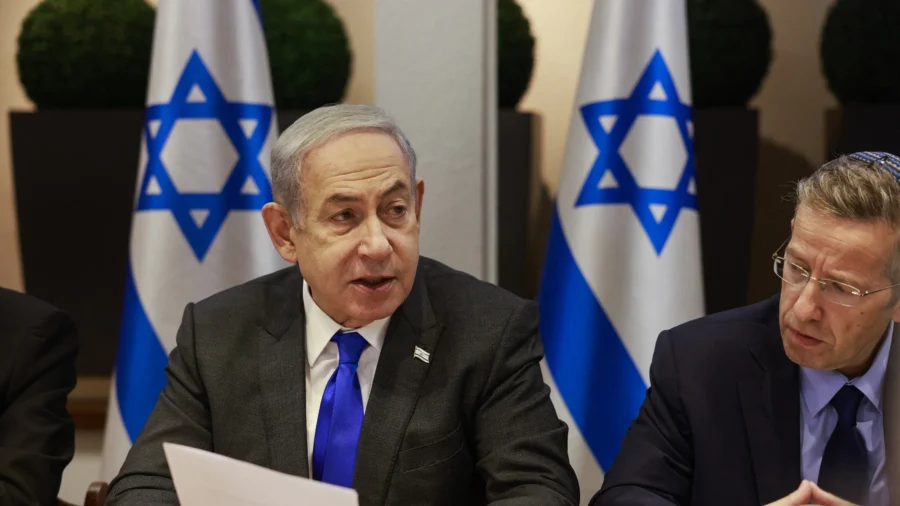Israeli Prime Minister Benjamin Netanyahu is again signaling plans for an Israeli ground offensive in the southern Gaza Strip city of Rafah, even as the Biden administration has increasingly pushed back on the idea.
Mr. Netanyahu reiterated his plans for a Rafah offensive while addressing Israel’s unicameral legislature, the Knesset, on Tuesday.
“We have been fighting for over five months, this is a record in the history of Israel’s wars, except for the War of Independence,” he said. “We are, of course, under growing international pressure, which we are rejecting, to achieve the goals of the war.”
A major wartime goal, which Mr. Netanyahu has articulated throughout the conflict and again on Tuesday, is to eliminate Hamas entirely.
“There is no alternative to this. We cannot go around it; neither can we say ‘We will destroy 80 percent of Hamas and leave 20 percent,’ because from that 20 percent, they will reorganize and take over the Strip again and, of course, constitute a new threat to Israel,” he said.
In order to completely eradicate the Israeli-designated terrorist group, Mr. Netanyahu said Israeli forces must press onward into Rafah.
“We are determined to complete the elimination of Hamas. This requires the elimination of the remaining battalions in Rafah,” the Israeli prime minister said.
Biden-Netanyahu Divided Over Rafah Offensive
For weeks, President Joe Biden and members of his administration have expressed concerns about the potential humanitarian cost of an offensive in Rafah.
Earlier on in the war, Israeli forces routinely advised residents in the northern parts of the Gaza Strip to evacuate southward to avoid being caught in the crossfire. About 1.4 million people, or around two-thirds of the population of the Gaza Strip, have since gathered in Rafah, which runs along the southern Israeli border with Egypt.
The Egyptian government has been reluctant to take in Gazans fleeing south from Rafah, though the Rafah crossing has served as a key avenue for humanitarian aid flowing into the strip.
Fielding questions about a possible Rafah offensive last month, U.S. State Department spokesman Vedant Patel said the Biden administration wouldn’t support such an Israeli military operation without “serious and credible planning” for the civilians there, and to ensure aid can continue to flow through the Rafah crossing.
President Biden reiterated his concerns about a Rafah offensive during a call with Mr. Netanyahu on Monday. According to a White House readout of the Monday call, President Biden and Mr. Netanyahu “agreed to have their teams meet soon in Washington to exchange views and discuss alternative approaches that would target key elements of Hamas and secure the Egypt-Gaza border without a major ground operation in Rafah.” Expanding further on the Monday call, White House National Security Advisor Jake Sullivan said the Biden administration is not opposed to Israel’s goal of defeating Hamas but believes Israel could target key Hamas elements without the further need for a major ground offensive in Rafah.
During his comments to the Knesset on Tuesday, Mr. Netanyahu cast doubt on the idea that the Biden administration will convince him of some alternate plan to a Rafah ground offensive.
“Out of respect for the President, we agreed on a way in which they can present us with their ideas, especially on the humanitarian side; of course, we fully share this desire to facilitate an orderly exit of the population and the providing of humanitarian aid to the civilian population. We have been doing this since the beginning of the war,” Mr. Netanyahu said. “However, I made it as clear as possible to the President that we are determined to complete the elimination of these battalions in Rafah, and there is no way to do this without a ground incursion.”
Election Comments Strain US-Israel Relations
Growing pressure from President Biden’s left flank may be complicating his relations with the Israeli Prime Minister.
Several Democrats have pressed for a ceasefire in the current Gaza conflict and have proposed attaching new humanitarian compliance requirements to new rounds of U.S. military aid for Israel. Such talk of ceasefires and humanitarian compliance requirements have stalled in Congress, and under President Biden’s leadership, the United States has vetoed three United Nations Security Council resolutions calling for a ceasefire.
Near the start of the Israel-Hamas war in October, the National Muslim Democratic Council (NMDC)—a group representing Muslim members of the Democratic Party—issued an ultimatum for President Biden to either support a ceasefire or risk losing their support in the 2024 election. More than 100,000 Michigan Democratic primary voters marked their ballots as “uncommitted” during the party’s recent presidential primary, corresponding to about 13.2 percent of ballots cast during that primary contest.
The Biden administration has gradually increased calls for greater restraint in Israeli military operations in the Gaza Strip. During his State of the Union address on March 7, President Biden said Israel must allow more humanitarian aid into the embattled territory and said such aid “cannot be a secondary consideration or a bargaining chip” and “protecting and saving innocent lives has to be a priority.”
In a Senate floor speech on Thursday, March 14, Senate Majority Leader Chuck Schumer (D-N.Y.) characterized Mr. Netanyahu as one of the major obstacles to a peaceful resolution of the Israel-Palestine conflict and called for new elections in Israel to replace the current prime minister. President Biden largely backed Mr. Schumer’s remarks, saying the top U.S. Senator “made a good speech” and “expressed a serious concern shared not only by him but by many Americans.”
Mr. Netanyahu rebuked Mr. Schumer’s election remarks, saying calls for new Israeli elections “will halt the war and paralyze the country for at least six months.”
“If we stop the war now, before all of its goals are achieved, this means that Israel will have lost the war, and this we will not allow. Therefore, we cannot, and will not, succumb to this pressure,” he added.

